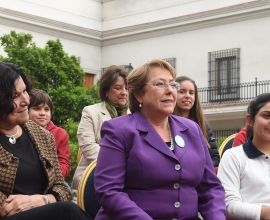The Chilean government sends the draft law adapting the country's legislation to the Convention on the Rights of the Child (CRC) to parliament
The Childhood Rights Act, in accordance with the CRC, establishes and ratifies the principle of the best interest of the child, understood as the maximum satisfaction of the child's rights as a whole
The Executive Secretary of the Childhood Rights Council, Estela Ortiz, indicated that “this project lays the groundwork for the institutional structure for children's rights which will be built and enhanced in discussion with civil society and parliament. This is an achievement of not only the government but also of the entire country. It is the specific way in which President Bachelet's government is strengthening its deep commitment to constructing the conditions for equality and justice for all boys and girls in Chile.
The European Union's EUROsociAL Programme has provided strong support through various activities: visits to learn about noteworthy experiences in Norway, France and Italy, in addition to meetings with specialised international bodies such as UNICEF, OECD and the Instituto degli Innocenti in Florence. Moreover, it supported the Childhood Rights Council through expert advisory missions and exchanges between Chilean civil servants and their European counterparts.
In the future law guaranteeing children's rights, the family assumes a fundamental role in the care and education of children, guided by this founding principle of a new relationship with children and adolescents and aiming to ensure full exercise of their rights in accordance with their progressive autonomy.
The law recognises children as subjects with rights, capable of exercising them personally, according to age and degree of maturity, and therefore able to act before State bodies to demand these rights in conformity with the law and under the guidance of their parents, where applicable. The law also establishes specific regulations regarding some of these rights in order to more strongly guarantee them or regulate how they are protected. Lastly, the law mandates that the State must have a permanent national policy on childhood and a plan of action.
Likewise, in the same act, President Bachelet ratified the draft law relative to the institution of a Sub-Secretariat of Childhood Rights, created to lead this important sector. Other figures created by this law, in line with the CRC and the situation of the countries visited with the support of EUROsociAL, are the Civil Society Council and the National Children's Council (in addition to the figure of the Children's Ombudsman).
EUROsociAL will continue supporting the Council through the production of evidence taken from the legislation and the performance of policies for guaranteeing rights for children and adolescents in the most advanced European countries to sustain the debate in the Chilean Parliament on the newly presented draft law.
IILA/CISP/Expertise France

